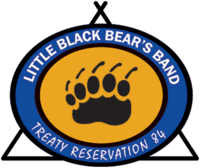Little Black Bear First Nation facts for kids
 |
|
| People | |
|---|---|
| Treaty | Treaty 4 |
| Headquarters | Goodeve |
| Province | Saskatchewan |
| Land | |
| Main reserve | Little Black Bear 84 |
| Other reserve(s) | |
| Land area | 79.017 km2 |
| Population (2019) | |
| On reserve | 212 |
| Off reserve | 380 |
| Total population | 592 |
| Government | |
| Chief | Clarence Bellegarde |
| Tribal Council | |
| File Hills Qu'Appelle Tribal Council | |
The Little Black Bear First Nation (which means kaskitêw-maskwa-maskosis in Cree) is a group of First Nation people. They are part of both the Cree and Assiniboine Indigenous groups. This community lives in southern Saskatchewan, a province in Canada.
Contents
Who are the Little Black Bear First Nation?
The Little Black Bear First Nation is an important Indigenous community. Their history is deeply connected to the lands of Saskatchewan. They are made up of people from both the Cree and Assiniboine nations. These are two large and historic Indigenous groups in North America.
Their Land and Reserves
The Little Black Bear First Nation has special lands called reserves. These reserves are areas set aside for First Nations people. They are important places for their culture and community life. The main reserves for the Little Black Bear First Nation include:
They also share another reserve with many other First Nations. This shared land is called Treaty Four Reserve Grounds 77. About 32 other First Nations also use this land.
Important Treaties
The Little Black Bear First Nation is part of Treaty 4. A treaty is like a big agreement between First Nations and the Canadian government. Treaty 4 was signed a long time ago, in 1874. It covers a large area of land in what is now Saskatchewan and Manitoba. Treaties are very important because they define the rights and relationships between Indigenous peoples and Canada.
How They Are Governed
Like many First Nations, the Little Black Bear First Nation has its own government. They have a leader called a Chief. The current Chief is Clarence Bellegarde. The First Nation is also part of a larger group called the File Hills Qu'Appelle Tribal Council. This council helps different First Nations work together on common goals.
 | May Edward Chinn |
 | Rebecca Cole |
 | Alexa Canady |
 | Dorothy Lavinia Brown |

